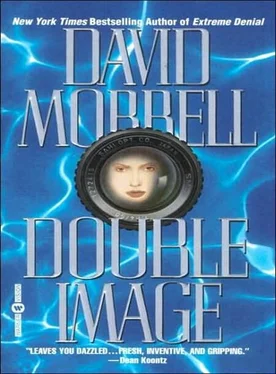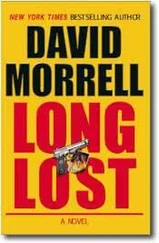It’s a perfectly feasible plan, Coltrane thought as he drove across the valley. It was simple. It had the merit of surprise. It had only one flaw. Ilkovic might be captured instead of killed. The UN tribunal might sentence him to life imprisonment instead of having him executed.
That’s not good enough. I know another way, Coltrane thought. He accessed the San Diego Freeway and drove south, grateful for the congested traffic, needing a reason to drive slowly so that Ilkovic wouldn’t have trouble keeping him in sight. He exited onto Sunset Boulevard, where traffic was only slightly less congested, and headed toward the Pacific Coast Highway. There, he proceeded north. He had always enjoyed this drive, the majesty of the Palisades on his right, the allure of the ocean on his left, the glinting waves, the gliding sailboats. But not this time. The only thing that occupied his attention was a plan that he rehearsed. Past Malibu, just when he began to fear that he wouldn’t find the road he was looking for, he saw it on the right, next to a weathered wooden sign that read MAYNARD RANCH. The road hadn’t changed since the first time he had used it three months previously. It was unpaved and narrow, and it led him up into the Santa Monica Mountains.
Since the cemetery, everything around him had seemed out of focus, in a haze. But now his perception sharpened. He had the sensation of seeing everything with the intensity of peering through a zoom lens. Every detail of his surroundings seemed magnified. He was struck by an overwhelming sense of the buckthorn, greasewood, and other scrub brush on the hills into which he drove. December rains had caused the chaparral to turn green, in contrast with the sand color of the desert soil, and under other circumstances, he would have stopped to photograph the differences in color and texture. But as he bitterly reminded himself, in place of a camera, he had brought a shotgun.
Near the highway, there had been service stations, restaurants, and motels. Along the base of the hills, there were occasional dilapidated ranch houses. But once the road twisted up into the hills, he had the impression of entering another time, of experiencing the solitary beauty of what Southern California had been like 150 years ago.
Just before steering over a ridge that cut off his view of the sloping land behind him, Coltrane checked his rearview mirror and thought he saw the dust of a following car. It was hard to be sure. The dust might merely have been nudged up by a breeze. Or it might have been the remnants of dust that he himself had raised. Or if the dust had been raised by someone else’s car, there was no certainty that the car belonged to Ilkovic. Someone who lived in one of the ranch houses might be returning home from an errand.
But Coltrane didn’t think so. Soon, he told himself. This is going to end soon. He kept seeing a mental image of his grandparents standing on tiptoes on the bench, with their arms tied behind them, duct tape across their lips, and a noose around their necks. He kept remembering the way his grandfather struggled to plead through the duct tape and how his asthmatic grandmother’s chest heaved. He had never wanted to get even with someone so much.
The road made a dogleg turn to the right, taking him higher and deeper into the brush-covered hills. But Coltrane knew that shortly the landscape would change from a faint December green to an appalling blackness. The section of hills that he drove through had escaped a raging brush fire three months earlier. A valley on the other side of these hills hadn’t been so lucky. Once owned by the western star Ken Maynard and used as the location for numerous cowboy movies in the thirties and forties as well as several western TV series, including Rawhide , during the late fifties and early sixties, the area had been devastated by the fire, which destroyed a replica of a western town that had doubled countlessly as Tombstone, Dodge City, and Abilene, and along whose streets everyone from Randolph Scott to Gary Cooper had walked.
Coltrane knew about the place because, just after the fire, Premiere magazine had asked him to go there and take photographs of the destroyed set, which the editor planned to juxtapose with stills from the famous movies that the set had been used in. With a fondness for some of the classics in which the valley and its set had been featured, Coltrane had turned down an important assignment in the Philippines. He had walked the ash-covered land, climbed burnt-over bluffs, and studied debris-filled streambeds, identifying many of the vistas with scenes he recalled from favorite movies.
The area fit all of his requirements. It was remote. It was abandoned. Equally important, it was familiar. Once he photographed a place, it became part of him.
As the road crested a ridge and the valley lay below him, spindly black skeletons of scrub brush punctuated the thick black ash that stretched in all directions. With the scorched timbers of the town in the distance, it was as thorough a wasteland as many war zones he had photographed.
Minus the corpses, he thought.
But if he had his way, there would definitely be one corpse here by nightfall.
JUST MAKE SURE THE CORPSE ISN’T YOURS, Coltrane thought.
At the bottom of the slope, the ash made the road hard to distinguish. He did his best to follow it, sometimes jouncing over rocks at the side. The ash wasn’t powdery. Rain had dissolved it into a paste, which hardened when the sun came out. Crusty, like dried black mud, it made a crunching sound as he drove over it. Glancing at his rearview mirror, he saw the tracks that his tires had made. Then his rearview mirror showed him something else: the bluff behind him, where a car appeared, stopping as its driver surveyed the barren landscape through which Coltrane proceeded.
That barrenness was another reason Coltrane had selected the area. There was only one set of tracks heading toward the blackened town, and those tracks belonged to Coltrane. If other people were in the area – a team of policemen, for example – their presence would be easily detectable because there was no place to conceal them. Their movements would have left scars in the ash, giving them away. Ilkovic would at first be on guard. But as the sterile nature of the site became manifest to him, his confidence would return.
The car, tiny in Coltrane’s rearview mirror, started down the slope.
Coltrane tried to put himself in Ilkovic’s place. What would Ilkovic be thinking? For certain, he’d wonder what Coltrane was doing here. It wouldn’t take him long to suspect that Coltrane might have lead him here. But for what purpose? To invite a confrontation? Apparently, Ilkovic found that notion appealing. Otherwise, he wouldn’t be descending into the valley, following Coltrane’s tire marks through the ash.
Coltrane slowed, letting the car, a dark sedan, gain on him. Ahead, the road dipped into a deep trough, then crossed a shallow stream, the site for innumerable movie ambushes. From those movies and from photographs that Coltrane had taken of the area, he knew that his car would be out of sight in the trough. He wanted Ilkovic to think that he was lying in wait for him down there. What he intended to do, though, was something else. The instant he reached the bottom of the embankment, he rushed from the car, opened the back door, and grabbed his shotgun from where he had hidden it under a sleeping bag before leaving Packard’s house. He raced toward a gully where another stream joined this one at a right angle. That second stream paralleled the road along which he had driven. Its bed was low enough that if he stooped, he couldn’t be seen as he ran along it.
Breathing hard, sweating, stretching his legs to their maximum, he charged along, avoiding a channel of water so that he wouldn’t make a splashing noise that would alert Ilkovic if his windows were open. Ilkovic would be wondering why Coltrane’s car hadn’t reappeared. Ilkovic would be slowing, then stopping, waiting until he knew where Coltrane’s car had gone. He wouldn’t go forward again unless he assured himself that he wouldn’t be entering a trap. Meanwhile, Coltrane sprinted closer, so close that he could now hear Ilkovic’s car, the faint drone of its motor. Flash floods had scoured the gully free of ash. There wasn’t any crust that his footsteps could break and cause noise. The only sounds he made were his labored breathing, which he struggled to restrain, and the brittle but subdued scrape of his shoes over gravel and rocks, which lessened when he reduced his pace, hearing Ilkovic’s car thirty yards to his left.
Читать дальше












